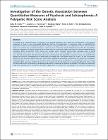| dc.contributor.author | MORRIS, DEREK | |
| dc.contributor.author | DONOHOE, GARY (JAMES) | |
| dc.contributor.author | GILL, MICHAEL | |
| dc.contributor.author | CORVIN, AIDEN PETER | |
| dc.date.accessioned | 2013-08-08T08:55:55Z | |
| dc.date.available | 2013-08-08T08:55:55Z | |
| dc.date.issued | 2012 | |
| dc.date.submitted | 2012 | en |
| dc.identifier.citation | Derks EM, Vorstman JA, Ripke S, Kahn RS, Schizophrenia Psychiatric Genomic Consortium, Ophoff RA, Investigation of the genetic association between quantitative measures of psychosis and schizophrenia: a polygenic risk score analysis., PloS one, 7, 6, 2012, e37852 | en |
| dc.identifier.other | Y | |
| dc.identifier.uri | http://hdl.handle.net/2262/66922 | |
| dc.description | PUBLISHED | en |
| dc.description.abstract | The presence of subclinical levels of psychosis in the general population may imply that schizophrenia is the extreme
expression of more or less continuously distributed traits in the population. In a previous study, we identified five
quantitative measures of schizophrenia (positive, negative, disorganisation, mania, and depression scores). The aim of this
study is to examine the association between a direct measure of genetic risk of schizophrenia and the five quantitative
measures of psychosis. Estimates of the log of the odds ratios of case/control allelic association tests were obtained from the
Psychiatric GWAS Consortium (PGC) (minus our sample) which included genome-wide genotype data of 8,690
schizophrenia cases and 11,831 controls. These data were used to calculate genetic risk scores in 314 schizophrenia
cases and 148 controls from the Netherlands for whom genotype data and quantitative symptom scores were available. The
genetic risk score of schizophrenia was significantly associated with case-control status (p
,
0.0001). In the case-control
sample, the five psychosis dimensions were found to be significantly associated with genetic risk scores; the correlations
ranged between.15 and.27 (all p
,
.001). However, these correlations were not significant in schizophrenia cases or controls
separately. While this study confirms the presence of a genetic risk for schizophrenia as categorical diagnostic trait, we did
not find evidence for the genetic risk underlying quantitative schizophrenia symptom dimensions. This does not necessarily
imply that a genetic basis is nonexistent, but does suggest that it is distinct from the polygenic risk score for schizophrenia | en |
| dc.description.sponsorship | Over 40 United States National Institutes of Health grants and similar numbers of government grants from other countries, along with substantial
private and foundation support, enabled this work. We greatly appreciate the sustained efforts of T. Lehner (National Institute of Mental Health) on
behalf of the
Schizophrenia Psychiatric Genome-Wide Association Study (GWAS) Consortium (PGC). Dr. E.M. Derks is supported by the Netherlands Scientific Organ
ization
(NWO; project number 451-080-010). Statistical analyses were carried out on the Genetic Cluster Computer (http://www.geneticcluster.org) which
is financially
supported by the Netherlands Scientific Organization (NWO 480-05-003). The funders had no role in study design, data collection and analysis, decis
ion to publish,
or preparation of the manuscript | en |
| dc.format.extent | e37852 | en |
| dc.language.iso | en | en |
| dc.relation.ispartofseries | PloS one; | |
| dc.relation.ispartofseries | 7; | |
| dc.relation.ispartofseries | 6; | |
| dc.rights | Y | en |
| dc.subject | schizophrenia | en |
| dc.subject.lcsh | schizophrenia | en |
| dc.title | Investigation of the genetic association between quantitative measures of psychosis and schizophrenia: a polygenic risk score analysis. | en |
| dc.type | Journal Article | en |
| dc.type.supercollection | scholarly_publications | en |
| dc.type.supercollection | refereed_publications | en |
| dc.identifier.peoplefinderurl | http://people.tcd.ie/acorvin | |
| dc.identifier.peoplefinderurl | http://people.tcd.ie/morrisdw | |
| dc.identifier.peoplefinderurl | http://people.tcd.ie/donoghug | |
| dc.identifier.peoplefinderurl | http://people.tcd.ie/mgill | |
| dc.identifier.rssinternalid | 80560 | |




